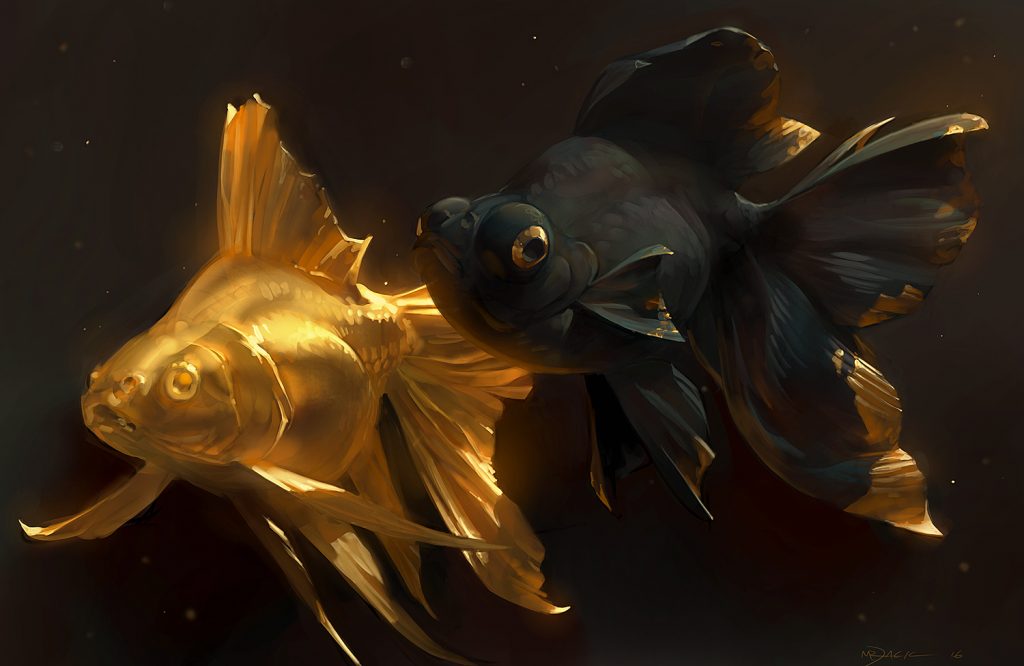I woke up that morning, shaking off a hangover headache and found them when I went to feed them before I left for work. I found them drifted to the top of the tank, their eyes, fins, unmoving. They died, as I discovered some time later, from ingesting pieces of a seashell I’d brought home from vacation years ago, and added to their tank for ambiance. I’m only left to imagine that they died in agony. I feel guilty about that.
At the end of the lesson, I asked the adjunct professor with the cigarette wrinkles around her lips what would happen to the goldfish now. She explained they had too many of these feeder fish, and they weren’t expected to live long anyway. She implied, heavily they’d be flushed. I felt a spasm of fear clench in my chest and I ran to the café in the building and asked for a plastic bag. I took the two fish from my table, and poured them in, skipping my next class and ran back to my room and a plastic pitcher in which they’d live for a few hours until I could get to a pet store to spend my week’s booze money on a tank and some food. That night, I named the shiny orange one Jack, and the swarthier muted gold one, Kilgore Trout, chuckling at my literary cleverness. I like to think they were pleased when I, thinking I was the pinnacle of wittiness changed my twitter bio to: “Writer, Rescue Fish Owner.”
The fish watched me as I struggled to find a job and relieve my parents of the burden of my presence. They studied me, while I cried after the call came from the friendly HR manager at the independent school to tell me that while the team really loved me, that I’d made it through three rounds of interviews, they were going with another candidate. The fish watched as I finally got the job offer so I could move away from home and to Boston. They came along on moving day, sealed in their tank, buffered by rolled-up towels behind the passenger seat.
They never remarked or made fun of me as I discovered how blissfully unaware of such day-to-day minutiae I was, such as how to prepare food for myself, or how to parallel park. Completely alone, and without a safety net, I rented a chilly one-bedroom east of the city to start my adult life, but I wasn’t alone.
At one point, two years ago, they fought off an awful infection where they grew lethargic and lost their appetites, a thick film formed over their eyes. I don’t know if they ever regained their sight, or if they were permanently blind from it. They couldn’t tell me. I poured aquarium salt and measured medication into the tank, hoping they’d survive. While they were sick, I hurt with them, I couldn’t imagine a life without them, these impassive guardians, these perpetual watchmen, their judgment eternally withheld.
They watched as Lisa and I took those first serious steps of moving in together, and as I finished graduate school. They floated by as I put my head in my hands with rejections and celebrated publications. They often stayed up with me as I worked late into the night, or early in the morning. Their tank positioned just to the left of my desk. The little bookshelf they sat on is empty now.
I’m choosing not to anthropomorphize here, I don’t know if they were happy or sad when they died. I don’t know if they felt like their lives were valuable and long, that they felt like they were satisfied. When one’s whole world was contained in twenty-gallons, I don’t know if they’re supposed to feel a great sense of accomplishment, or maybe their moving of the rocks around was enough. Maybe they felt proud of their home. Maybe they hated it, but without vocal cords, they couldn’t yell to me and tell me.
For three years, they watched me impassively, floated peacefully beside me as I moved about the world, theirs no larger than the area of the twenty-gallon tank. They floated by and watched, but I like to think with a sense of pride.
